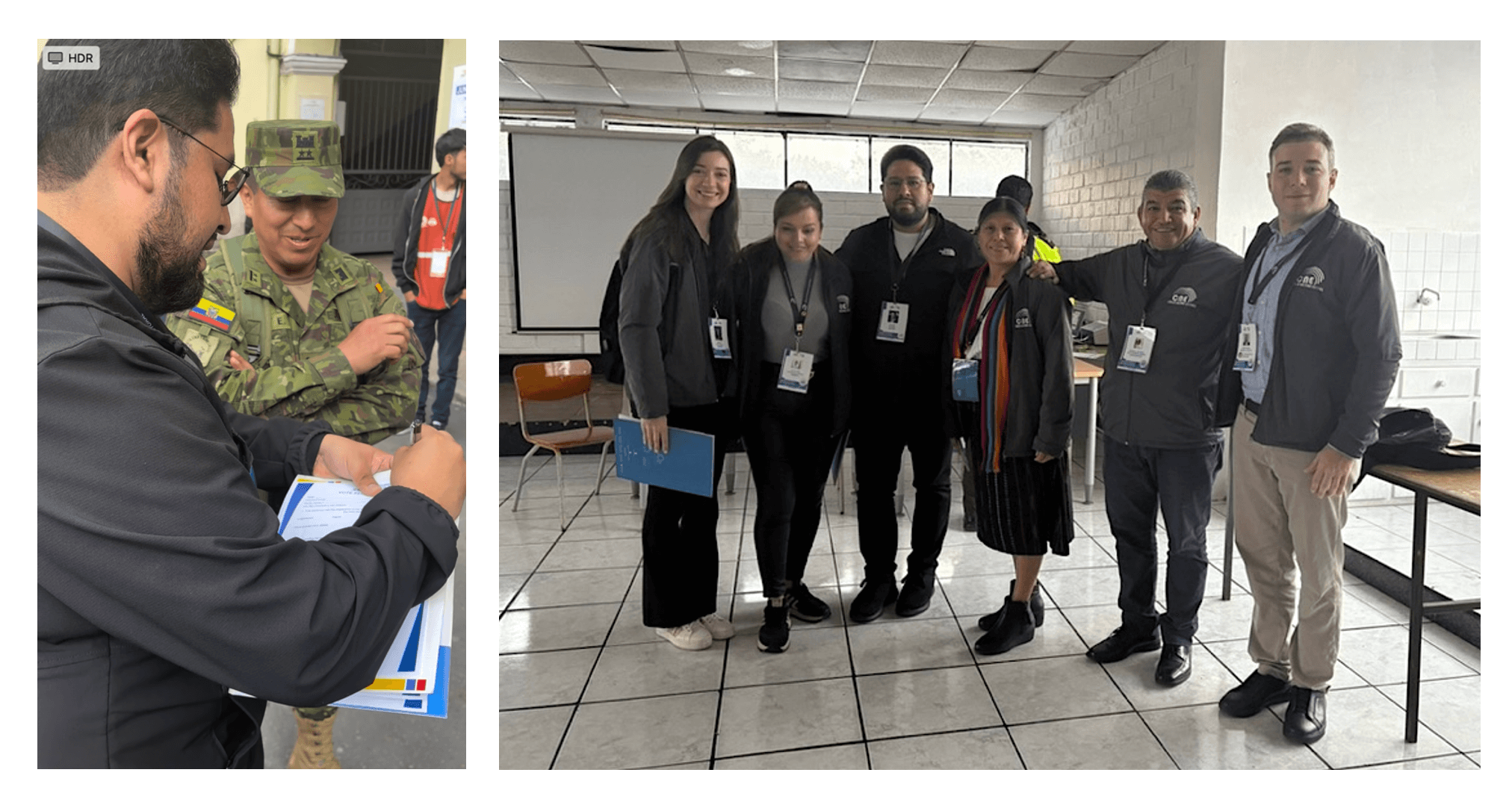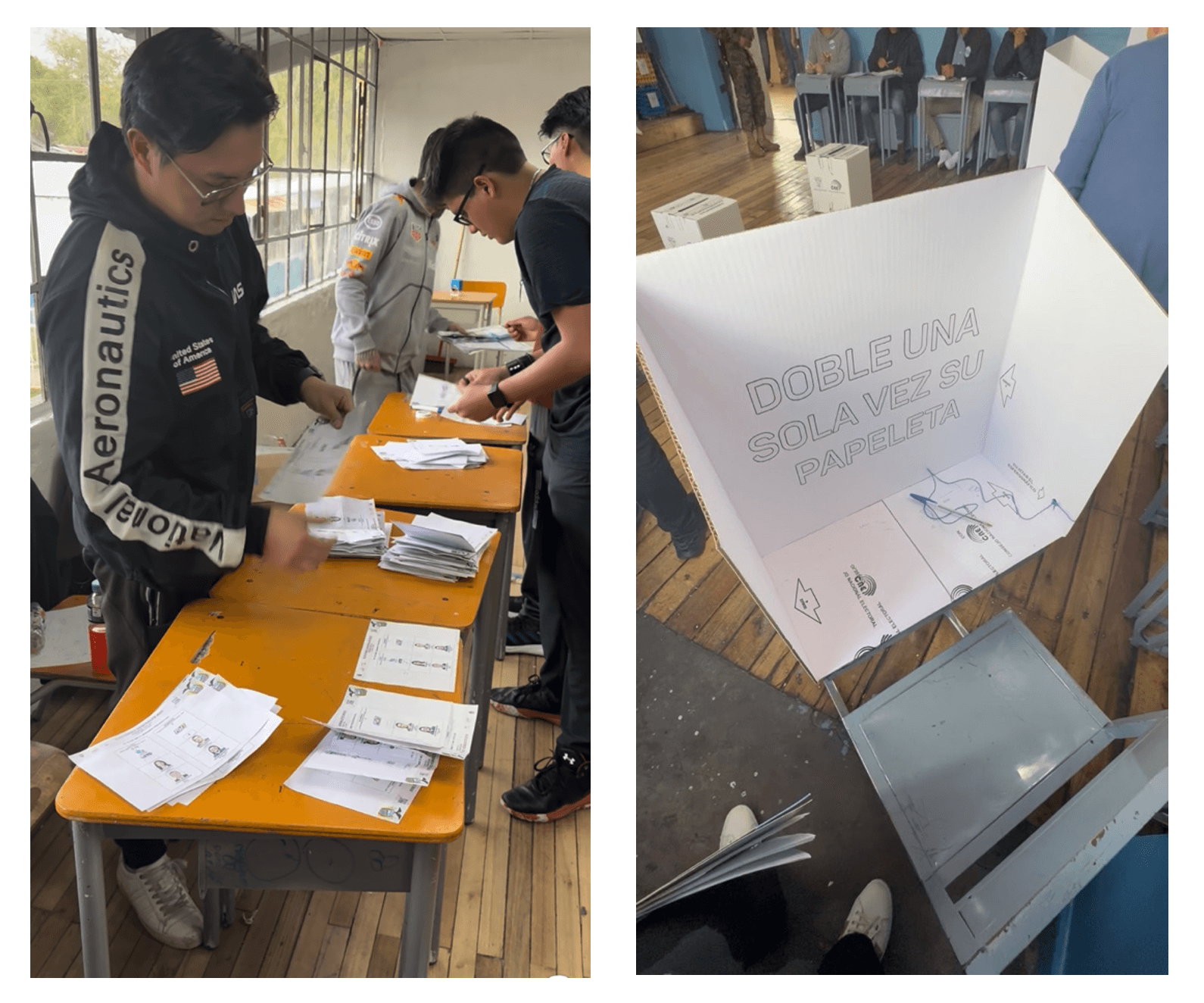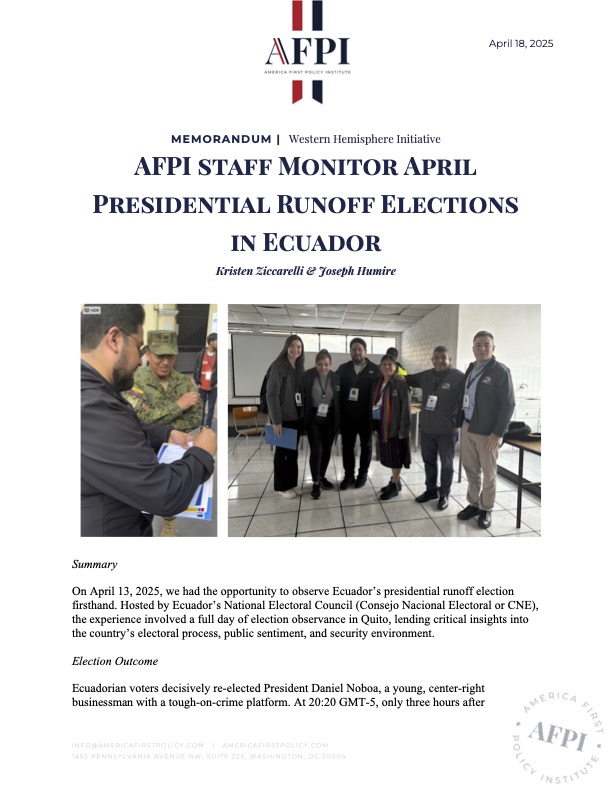AFPI Staff Monitor April Presidential Runoff Elections
Summary
On April 13, 2025, we had the opportunity to observe Ecuador’s presidential runoff election firsthand. Hosted by Ecuador’s National Electoral Council (Consejo Nacional Electoral or CNE), the experience involved a full day of election observance in Quito, lending critical insights into the country’s electoral process, public sentiment, and security environment.
Election Outcome
Ecuadorian voters decisively re-elected President Daniel Noboa, a young, center-right businessman with a tough-on-crime platform. At 20:20 GMT-5, only three hours after polls closed in Quito, the CNE certified that Noboa won the election. Overall, he secured 55.8% of the vote, with over 92% of ballots counted. His challenger, leftist attorney Luisa González, took 44% of the vote.
U.S. Interests for the Trump Administration
President Noboa’s victory is a huge win for the U.S. and for the Trump Administration’s priorities, as Noboa has already demonstrated his willingness to cooperate with America to crack down on transnational organized crime and curb illegal immigration transit in Ecuador. Having a neighboring country with shared goals in countering the People’s Republic of China (PRC) and Iran is crucial to achieving America First policies in the hemisphere. President Noboa has expressed an interest to lift a ban on foreign military bases (imposed by Rafael Correa in 2009) to allow the U.S. to reopen its Air Base in Manta. Moreover, other strategic sites, such as the Galapagos Islands, present additional opportunities to secure strategic waterways to and from the Panama Canal. U.S.-Ecuador security cooperation will no doubt become a cornerstone of bilateral relations during the Trump administration, providing an opportunity to crack down on the Mexican Cartels that are heavily present in Ecuador moving massive drug shipments through the Pacific to Europe, Asia, and the West Coast of the United States. On immigration, with President Trump enforcing the law at our Southern border, Panama’s President Mulino shutting down the Darien Gap, and Noboa halting the transit of Chinese migrants through their country, there is real opportunity for continued progress for a more peaceful and prosperous region.

Our Key Observations
- Mandatory Voting: Ecuador mandates voting for its citizens, imposing a $47 fine for noncompliance. Unsurprisingly, turnout was robust at approximately 85%.
- Strict Enforcement in Voting Booths: New laws strictly prohibit the use of cameras or phones inside voting booths, with violators subject to fines ranging from $9,000 to $30,000. As we observed the ballot counting at 17:00, we were informed by the electoral staff that at least one person had been caught violating this rule at the voting center we were observing.
- Military Presence: Public trust in the military remains strong—second only to the Catholic Church. Armed soldiers with visible rifles were stationed throughout the country, maintaining a significant presence at polling locations. Voters frequently turned to them for guidance. Police were also stationed around the perimeter of voting locations, though we were informed that they are much less trusted than the military.
- Election Administration:
- Election staff largely included young volunteers, potentially middle to high school-aged, selected via a lottery system similar to jury duty in the U.S.
- Polling stations, primarily located in schools, operated in a calm and orderly manner across neighborhoods of varying income levels.
- Voting ended promptly at 17:00, with no exceptions. Since there were no lines in our observed polling places, this did not seem to be an issue.
- Ballot counting was public and transparent. Individual votes were read aloud, tallied in groups of ten, and re-certified for accuracy.
- Ballots were counted by gender – all female votes cast were counted by women and male votes by men.
- Each ballot station had accommodations set up for citizens needing extra accessibility assistance.
- Alcohol Ban: The sale and consumption of alcohol is banned for two days prior to and including Election Day. According to conversations with local Ecuadorians, this is a mechanism designed to encourage turnout.
Election Integrity
Because of the tight margins of the previous election, and the polling which predicted a near-tie outcome, we were informed of fraud that may happen in some of the following situations:
- Vote Buying: Transnational Criminal Organizations (TCOs) or cartels offering $20 to voters in exchange for completing ballots in favor of a preferred candidate.
- Tampering with Ballots: Election counters using large rings to scratch or invalidate ballots.
We joined over 100 international observers from all around the world to watch the electoral process in Quito. The voting that we witnessed on Sunday in six separate polling stations was peaceful, orderly, upbeat and efficient, facilitating the voting of citizens from all age and gender demographics. The CNE was very professional and impartial to the candidates.
Takeaways from the Electoral Process
Ecuador’s electoral process presents a mix of firm rule enforcement and widespread civic participation. The high voter turnout, strong military presence, and transparent counting procedures suggest a well-functioning electoral apparatus, albeit one not immune to vulnerabilities—particularly in relation to organized crime. Particularly impressive was that with the entire country using paper ballots, the results were announced just under three and a half hours after polls closed in Quito. Though Luisa Gonzalez refused to accept the outcome of the elections, the CNE dismissed her claims of fraud and reaffirmed that the elections were fair and accurate.
Takeaways from Daniel Noboa’s Victory
Daniel Noboa’s wide margin of victory reflects deep public concern over escalating crime, violence and an appetite for strong leadership on public safety. It also reflects the continued rejection of former President Rafael Correa, whose shadow loomed large over the candidacy and campaign of Luisa Gonzalez. Correa, who was Ecuador’s president for ten years (2007-2017) has been living in Belgium since leaving the presidency and in 2020 was found guilty, in absentia, of bribery and public corruption. He was sentenced to eight years in prison by a national court. Having endured 10 years of “Correaismo” it appears that Ecuador has turned the page with Noboa’s victory, at least for the time being. From a policy standpoint, his victory certainly offers an opportunity for Ecuador to align closer to Western nations, namely the U.S., and away from the People’s Republic of China (PRC).

